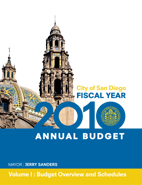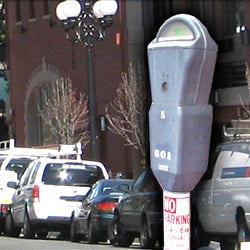Fiscal Year 2010 Annual Budget

- Introduction
- Volume I: Budget Overview and Schedules
- Volume II: Department Detail
- Volume III: Capital Improvements Program
A Message From Mayor Sanders
To my fellow San Diegans,
In this time of global economic crisis, we are confronted by extraordinary challenges that require us to come together, as a community, to reconfirm our priorities and define the kind of City we want to be.
These shared goals are expressed each year in our City budget. It spells out our needs, quantifies what we can afford, and sets in motion the initiatives and corrective measures that will keep us on a true course.
As your Mayor, I am committed to sustaining the important financial reforms that have restored the stability and credibility of our City. Whatever circumstances we face, be assured that I will run this City in a fiscally responsible way and keep my pact with the public to put their interests before all others.
I present this document, the City's Annual Budget for Fiscal Year 2010, in the strong belief that it continues this process of fundamental reform, that it provides the surest path to overcoming the City's financial challenges, and that it respects both the interests of the taxpayers and our responsibility to future generations.
I have worked successfully with my management team to develop this balanced budget, mindful of not only our immediate needs, but of the need to reduce the City's structural deficit and to update the significant fiscal initiatives described in the comprehensive Five-Year Financial Outlook that I released in November.
I am indebted to the hundreds of employees who sent me their suggestions on budget efficiencies, and to Councilman Tony Young, the chairman of the Council Budget and Finance Committee, for organizing public input through his "San Diego Speaks" program. This budget incorporates many thoughtful ideas from these sources, while others are being considered for Fiscal Year 2011.
The total budget for Fiscal Year 2010 is $2.94 billion. This includes $1.13 billion for General Fund operations and $1.34 billion for operation of the City's Enterprise Funds and other fund activities. Another $478.4 million is budgeted for capital improvement projects across the City. A complete copy of the budget is available on the City's website at www.sandiego.gov
With the adoption of this budget, the City will accomplish these important goals:
- safeguard our essential core services, including police and fire, streets and water;
- lower risk to the taxpayers by reducing the City's structural deficit;
- close the General Fund budget deficit without cutting services or reducing hours at our libraries and recreation centers;
- fortify emergency reserves that were previously under-funded, including the General Fund reserve and the critical Public Liability Fund;
- recognize that economic cycles cannot halt our progress, by opening and operating long-planned library and park facilities, initiating community plan updates and replacing fire-station alert systems to reduce response times;
- sustain the process of financial reform I have implemented, and continue our progress in clearing the backlog of deferred maintenance projects left by previous administrations, and,
- protect our hard-working employees and their families by saving jobs at a time when the job market offers few opportunities for new employment.
This budget accomplishes these goals despite our increasing financial obligations and an economic downturn that has lowered revenue growth. To do so, however, we have had to make tough choices, especially when deciding how to reduce the ever-widening portion of our budget that is devoted to compensation and retirement costs.
In previous budgets, I have taken savings by reducing positions and keeping compensation increases to a minimum. Since fiscal year 2007, the City has eliminated 882.71 total positions, trying whenever possible to cut vacant positions to minimize the trauma that layoffs bring to employees and their families. These position cuts are part of my ongoing effort to streamline the City's workforce and reduce the layers of management that have built up at the City over many years.
The positions eliminated from the budget in that time have resulted in permanent savings to the City in personnel costs alone of $69.2 million. This budget reflects a net elimination of 157.18 FTE positions, an amount that includes the 150.95 positions cut as part of the Fiscal Year 2009 Revised Budget approved by City Council on December 9, 2008 and modified on February 3, 2009, and carried forward into Fiscal Year 2010.
Positions Cut in Fiscal Year 2007 38.00
Positions Cut in Fiscal Year 2008 629.71
Positions Cut in Fiscal Year 2009 57.82
Positions Cut in Fiscal Year 2010 157.18
TOTAL POSITION CUTS 882.71
This budget recognizes that deeper cuts to the City workforce cannot be achieved without long-term harm to our service levels -- through the closure of libraries and recreation centers, reduced levels of public-safety coverage, and similar diminutions in City functions that are not acceptable to me or to the public.
Instead, roughly half the savings needed to balance the budget were sought through wage concessions that affected every City employee, in every department and every job classification. In this way, the City can reduce its workforce costs, and rein in retirement costs, without putting any employee out on the street at a time when the jobless rate is at a 25-year high.
The City engaged in negotiations with its five recognized labor organizations from late January 2009 through early April. The City reached agreements with the International Association of Firefighters Local 145 (IAFF Local 145), the Municipal Employees Association (MEA), and the Deputy City Attorneys Association (DCAA) labor unions. The City imposed terms and conditions on the Police Officers Association (POA) and the American Federation of State, County, and Municipal Employees Local 127 (AFSCME Local 127).
The total citywide savings resulting from the labor concessions is $43.8 million. This included $32.9 million in General Fund concessions needed to balance the budget. The savings to the Non-General Funds is $10.9 million.
The compensation concessions we achieved for this fiscal year will benefit the City long after I have left office through corresponding reductions in our long-term benefit and retirement costs. Those costs must be addressed comprehensively, or they will grow at a rate that undermines the very mission of City government. As I will continue to make clear, our primary purpose must remain focused on providing services to the public.
These across-the-board changes in compensation levels will take place concurrent with the substantive pension reforms I accomplished in my first term, which lower City costs and create a hybrid pension plan with a 401(k) component. Together, these steps will provide significant relief in future years, when the City's Annual Required Contribution to the pension system is expected to grow.
Since taking office in the midst of a civic leadership crisis, restoring the City's fiscal stability has been my top priority. In the past two years, the City has also made extraordinary progress in bringing its long-overdue financial reports up to date. Thanks to the work done by the City's new financial management team, we have been able to release Comprehensive Annual Financial Reports with unqualified audit opinions for fiscal years 2003, 2004, 2005, 2006, 2007 and 2008.
The release of these reports, and the positive impact of these reform efforts, is already evident as Fitch Ratings, Standard & Poor's, and Moody's Investors Service have revised the City's credit ratings and the rating outlook on San Diego from negative to positive or stable, a further indication of the financial stability the City has achieved. This year the City returned to the public credit markets after a five-year absence to finance infrastructure improvements, receiving an excellent response from investors.
The Fiscal Year 2010 Annual Budget continues the City's progress toward my goal of long-term fiscal stability. In addition to addressing the problems created by the City's compensation and retirement costs, I will once again dedicate additional funding to eight significant areas of concern that had been neglected or under-funded in the past. These areas include funding for:
- The City's Pension Plan
- The City's General Fund reserves
- The City's deferred maintenance and capital improvement needs
- The City's Retiree Health-Other Post Employment Benefits (OPEB)
- The City's obligations under the California Regional Water Quality Control Board (Municipal Storm Water Permit)
- The City's obligations under the Americans with Disabilities Act (ADA)
- The City's Workers' Compensation Fund reserves
- The City's Public Liability Fund reserves
Over the past four years, thousands of San Diegans have shared with me their views on our civic priorities. They have delivered an unequivocal message that they do not want to see City service levels reduced further, and that they believe retirement costs must be addressed in a way that is equitable to employees and taxpayers alike. And they have demanded honesty and transparency from their elected officials and in the conduct of City business.
This new budget respects those wishes. It illustrates how far we have come since I took office to change the way the City manages its finances and to refocus our attention on providing core services and meeting our essential financial obligations. I hope you find this description of the City's budget clear and accessible, that you share its priorities and that you believe, as I do, that it puts our City on the right course.
Sincerely,
JERRY SANDERS
Mayor























